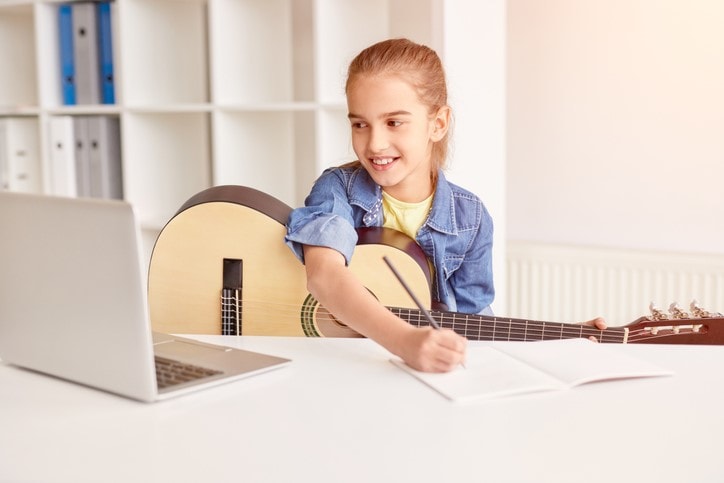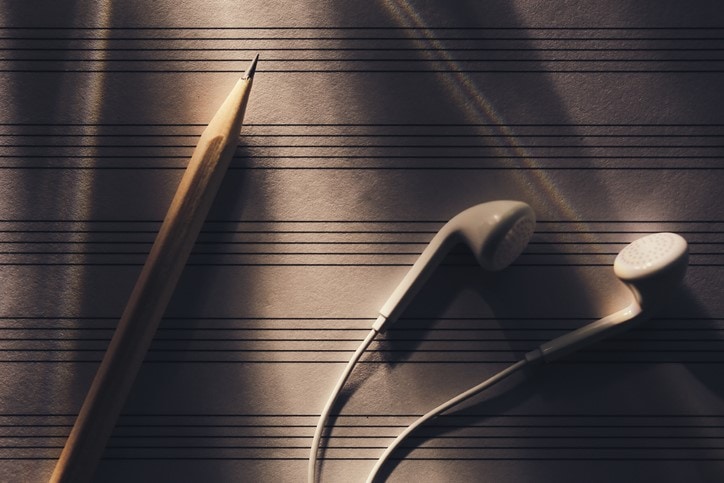/ News Posts / An Opportunity: Where Does Music Education Go from Here?
An Opportunity
Where Does Music Education Go from Here?
By Anne Fennell, NAfME Council for Innovations Chair
This article first appeared on Anne Fennell’s blog.
We have an opportunity. Right here, right now, to reimagine music education into what it can be and capitalize on the time given to us to learn, grow, and open ourselves to the next unknown. Tradition and history have repeatedly demonstrated that the norm in music education included large performance ensembles, and while we honor this and the past, we now have an opportunity to leap into our next unknown that is calling us to reimagine all that is possible.
How we have made music in public schools is important, but in the end, when all is said and done, how do those experiences support a trajectory toward lifelong music-making and incorporate how each individual learns? What if how we make music in public education takes the best from the past, grows with what they are learning now, and burgeons into something larger than anything we could imagine? I don’t know what is next or all that is possible, just like I never knew an invisible virus could compress educational panic, change, and reform into a four-week crash course.
With this new moment and time we get to model learning and growing and support students to become lifelong musicians while we empower them to learn and create on their own. Our students are in the midst of new possibilities that could lead them, and all of us, into a new cultural expansion because we are modeling the endless possibilities that are greater than any single teacher or any single ensemble experience. These are lifelong skills that no one can ever take away from a person, and they become an integral part of a person’s humanity, cultural experience, and their creative, intellectual, and developmental growth.
Now, as we coach and cheer through a computer screen and tell each student that we believe in them, we are modeling that every student counts. I’m writing this again: When we tell each student that we believe in them, we are also modeling that every student counts. We’ve never had so much time to support, see, and listen to individuals, but now every student has the opportunity to be seen and heard.
The collective whole of large ensembles created beautiful outcomes with lifelong memories, and were/are culturally significant and important. However, if we choose to focus only on what was and continue to mourn how music was created, we will lose this opportunity and moment in time to focus on student-centered work. So let’s not hold student learning hostage.
What if music education isn’t about the largest ensemble, the next competition, or the marching band? What if music education is about the individual student—an independent learner who can reflect with guidance, while creating and responding to music and making connections that we previously didn’t take time to teach? What if music education is a continual growth that contributes to the culture and well-being of individuals, and to our nation, through a lifelong process that expands as every human ages and grows on a continuum of learning?
Let me be perfectly clear when I say that an individual’s growth can only be beneficial to music education programs and ensembles. I have never heard of an ensemble weaken because its members were independent and confident learners. In fact, I can only imagine exponential growth with this.
Right now, we get to take advantage of the circumstances to truly transform music to all that it can be. Let us demonstrate that music creates transformative value as we activate students to create an uplifting change for individuals and our collective society. And in every action and word, may we demonstrate to our students that how they create music is valid and what music they create is AS important as any other music.
For years, the larger and progressive institutions of education have begged to make learning relevant and to reach beyond school walls. Well, here we are—literally—outside of the school walls. Now we must run with it! Don’t let a computer screen determine the amount of growth or the potential of what each human can create and learn. Let’s support learners to explore their relevant and vast world as they explore their interests and how they choose to learn and make music. Students will see themselves as we frame them, so let that frame and guidance be student-centered so they can see their brilliance.
This is a time to demonstrate resilience and nimbleness to improve and adapt the how of teaching and expand the what of music education so that students can experience all that is possible. This is a time to model to our learners that we believe in them to go beyond the closed doors of the traditional walls. The survival of education is crucial to our country’s success and the development of our collective culture. But survival, predicated on “how we used to do things” is living in a past that breeds comfort and misses the possibility of growth. Let’s take our knowledge and expand.
Let’s rise above the average person lamenting and demonstrate to everyone what music education is and can be. We must do more than what we have done in the past to arrive at our new destination. We must approach it differently because the lens through which we see and hear music is changing.
So when the moment arrives, and you can finally reunite with your students, know that you were the contributing factor to these creative musicians and new learners who think independently and who have ideas to share. Know that you supported each person to rise with resilience, with empathy and self-reflection, and that you encouraged each person to connect and interact to the world of making music in all the ways possible. Know that you as a music educator ennobled and empowered all to grow, and in turn created a cultural explosion of learning and music that contributed to the expansion of our collective culture. Know that you helped create a whole musician, who has a deep understanding, ownership, and application of all facets and connections of and to music, defining a new human and learner. Know that you were, and are, the foundation to a new music education.
The success of the ensembles, students, and music education programs will be determined by the nimbleness and expanding mindset of the music educator. So, believe passionately in the student, the opportunity, and our next unknown, and resolve to say:
- YES to all students as independent learners
- YES to small ensembles and chamber music
- YES to large ensembles reimagined
- YES to student choice and questioning
- YES to composition and creating music
- YES to reading, writing, and speaking about music
- YES to music connections beyond the school walls
- YES to discovery of past, current, and future music and composers
- YES to connecting to the true and relevant WORLD of music
- YES to students discovering new music, groups, and possibilities
Yes, and YES, and YES!
About the author:
 Anne Fennell is the K–12 Music Program Manager for San Diego Unified School District in San Diego, California. She holds a Bachelor’s in Music Education, a Masters in Leadership Studies, Orff-Schulwerk certification for levels I, II, and III and has additional training and certifications in world music studies, Character Education, Gifted and Talented Education, and Cross-Cultural Language and Academic Development. Her experiences include 32 years of teaching Kindergarten through Grade 12 music education, integrated arts and music, leading performance ensembles in civic and professional organizations and national conferences, including the annual NAMM Board of Directors meeting (2013 & 2016), and teaching three levels of both steel drum ensembles and music composition through technology, grades 9–12. Her ensembles have been featured in both InTune Monthly and NAfME’s Teaching Music magazines.
Anne Fennell is the K–12 Music Program Manager for San Diego Unified School District in San Diego, California. She holds a Bachelor’s in Music Education, a Masters in Leadership Studies, Orff-Schulwerk certification for levels I, II, and III and has additional training and certifications in world music studies, Character Education, Gifted and Talented Education, and Cross-Cultural Language and Academic Development. Her experiences include 32 years of teaching Kindergarten through Grade 12 music education, integrated arts and music, leading performance ensembles in civic and professional organizations and national conferences, including the annual NAMM Board of Directors meeting (2013 & 2016), and teaching three levels of both steel drum ensembles and music composition through technology, grades 9–12. Her ensembles have been featured in both InTune Monthly and NAfME’s Teaching Music magazines.
Did this blog spur new ideas for your music program? Share them on Amplify! Interested in reprinting this article? Please review the reprint guidelines.
The National Association for Music Education (NAfME) provides a number of forums for the sharing of information and opinion, including blogs and postings on our website, articles and columns in our magazines and journals, and postings to our Amplify member portal. Unless specifically noted, the views expressed in these media do not necessarily represent the policy or views of the Association, its officers, or its employees.
Catherina Hurlburt, Marketing Communications Manager. May 18, 2020. © National Association for Music Education (NAfME.org)
Published Date
May 18, 2020
Category
- Ensembles
- Innovation
- Music Education Profession
- Music Educator Workforce
Copyright
May 18, 2020. © National Association for Music Education (NAfME.org)







